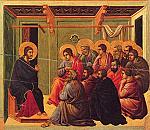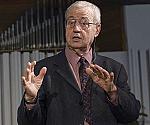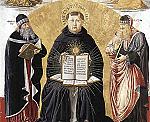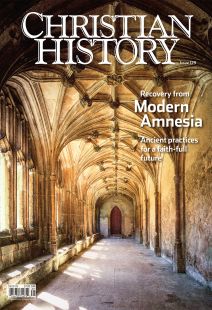New challenges, ancient solutions
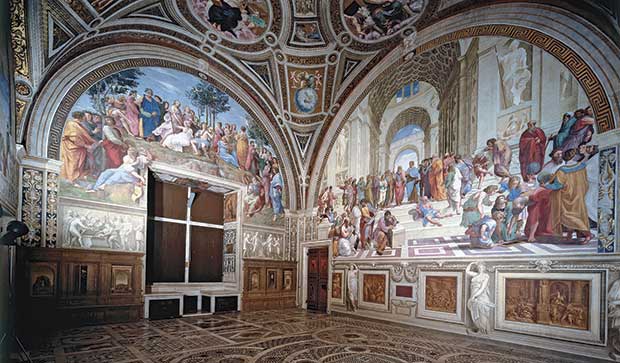
[Are the Raphael Rooms at the Vatican a symbol of tradition to reclaim or excess to avoid? Wikimedia]
Written by Bob Webber and a team of advisers, the “Call to an Ancient-Evangelical Future” (2006) critiqued evangelical practices of worship and discipleship that Webber felt were captive to modernity and called Christians to practice a faith consistent with inherited tradition.
IN EVERY AGE the Holy Spirit calls the Church to examine its faithfulness to God’s revelation in Jesus Christ, authoritatively recorded in Scripture and handed down through the Church. Thus, while we affirm the global strength and vitality of worldwide Evangelicalism in our day, we believe the North American expression of Evangelicalism needs to be especially sensitive to the new external and internal challenges facing God’s people.
These external challenges include the current cultural milieu and the resurgence of religious and political ideologies. The internal challenges include Evangelical accommodation to civil religion, rationalism, privatism and pragmatism. In light of these challenges, we call Evangelicals to strengthen their witness through a recovery of the faith articulated by the consensus of the ancient Church and its guardians in the traditions of Eastern Orthodoxy, Roman Catholicism, the Protestant Reformation and the Evangelical awakenings.
Ancient Christians faced a world of paganism, Gnosticism, and political domination. In the face of heresy and persecution, they understood history through Israel’s story, culminating in the death and resurrection of Jesus and the coming of God’s Kingdom. . . .
On the Primacy of the Biblical Narrative: We call for a return to the priority of the divinely authorized canonical story of the Triune God . . . summarized by the early Church in its Rules of Faith. . . .
On the Church, the Continuation of God’s Narrative: We call Evangelicals to take seriously the visible character of the Church. . . .
On the Church’s Theo-logical Reflection on the Continuation of God’s Narrative: We call for the Church’s reflection to remain anchored in the Scriptures in continuity with the theological interpretation learned from the early Fathers. . . .
On the Church’s Worship as Telling and Enacting God’s Narrative: We call for public worship that sings, preaches and enacts God’s story. We call for a renewed consideration of how God ministers to us in baptism, Eucharist, confession, the laying on of hands, marriage, healing and through the charisma of the Spirit. . . .
On Spiritual Formation in the Church as Embodiment of God’s Narrative: We call for a catechetical spiritual formation of the people of God that is based firmly on a Trinitarian biblical narrative. . . .
On the Church’s Embodied Life in the World: We call for a cruciform holiness and commitment to God’s mission in the world . . . [as] faithful stewards of the created order and bold prophets to our contemporary culture. . . .
Epilogue: We set forth this Call as an ongoing, open-ended conversation. We are aware that we have our blind spots and weaknesses. Therefore, we encourage Evangelicals to engage this Call within educational centers, denominations and local churches through publications and conferences.
We pray that we can move with intention to proclaim a loving, transcendent, Triune God who has become involved in our history. In line with Scripture, creed and tradition, it is our deepest desire to embody God’s purposes in the mission of the Church through our theological reflection, our worship, our spirituality and our life in the world, all the while proclaiming that Jesus is Lord over all creation. —From “A Call to an Ancient Evangelical Future” (also known as the “AEF Call”)
By Bob Webber et al
[Christian History originally published this article in Christian History Issue #129 in 2019]
Next articles
Living a “with-God” life
The friendship of Richard Foster and Dallas Willard and the birth of Renovaré
Tina FoxChristian History Timeline - Responses to Modernity
Attempts to recover the spirit of the first Christians are almost as old as Christianity itself, but we focus here on those that arose in some way as a response to problems of the modern world.
the editorsSupport us
Christian History Institute (CHI) is a non-profit Pennsylvania corporation founded in 1982. Your donations support the continuation of this ministry
Donate



